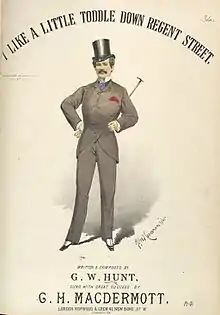G. H. MacDermott
Gilbert Hastings MacDermott (born John Farrell, 27 February 1845 – 8 May 1901) was an English lion comique, who was one of the biggest stars of the Victorian English music hall. He performed under the name of The Great MacDermott, and was well known for his rousing rendition of a war song he was persuaded to buy from G. W. Hunt for one guinea. The song's chorus of "We don't want to fight but by jingo if we do, We've got the ships, we've got the men, and got the money too!" introduced the word jingoism into the English language.[1]

The song became hugely popular in 1878, so much so that the Prince of Wales, the future King Edward VII, had MacDermott sing it for him at a private audience. He was far from a one hit wonder however. In fact he had written and published several plays and acted in many of them. The war song was brought back several times by other artists and was sung in an altered version during the First World War.
Life and career
MacDermott was born in Islington in 1845, and named John Farrell. His parents were Patrick Farrell, an Irish bricklayer, and Mary McDermott, also from Ireland, a laundress. He had left home by 1861 to join the navy and in 1866 married Mary Ann Stradwick, by whom he had a son. From humble beginnings MacDermott became a wealthy man. In 1883 he lived in Lambeth with a young actress Annie Milburn, daughter of actor James Hartley Milburn, and had another four children, all of whom adopted his stage name of MacDermott.
He later became a successful theatrical agent and managed several famous music halls. He died in 1901 from cancer at the age of 56. His youngest child, Annie Louise Mary MacDermott, later became a stage star by the name of Ouida MacDermott.
In an obituary on 9 May 1901, The Daily Telegraph called G. H. MacDermott the last lion comique, artists whose stage appearance resplendent in evening dress contrasted with the cloth cap image of most of their music hall contemporaries. The MacDermott family grave is at West Norwood Cemetery. Ouida is buried in the Roman Catholic Churchyard at Old Hall Green, Hertfordshire.
References
Notes
- Jackson 1998, p. 332
Bibliography
- Jackson, Russell (1998), Victorian Theatre: The Theatre in Its Time, New Amsterdam Books, ISBN 978-0-941533-72-0
- Parker, John (1912). . In Lee, Sidney (ed.). Dictionary of National Biography (2nd supplement). 2. London: Smith, Elder & Co.
External links
- A photograph of MacDermott. Last retrieved 18 March 2012.
- The Mystery of Edwin Drood, including a description of MacDermott's famous version (Britannia Theatre, 22 July 1872). Last retrieved 5 January 2012.
- Photograph of his daughter Ouida MacDermott. Last retrieved 5 January 2012.
- The complete lyrics of the "Jingo War Song" with the tune in midi and mp3. Last retrieved 5 January 2012.